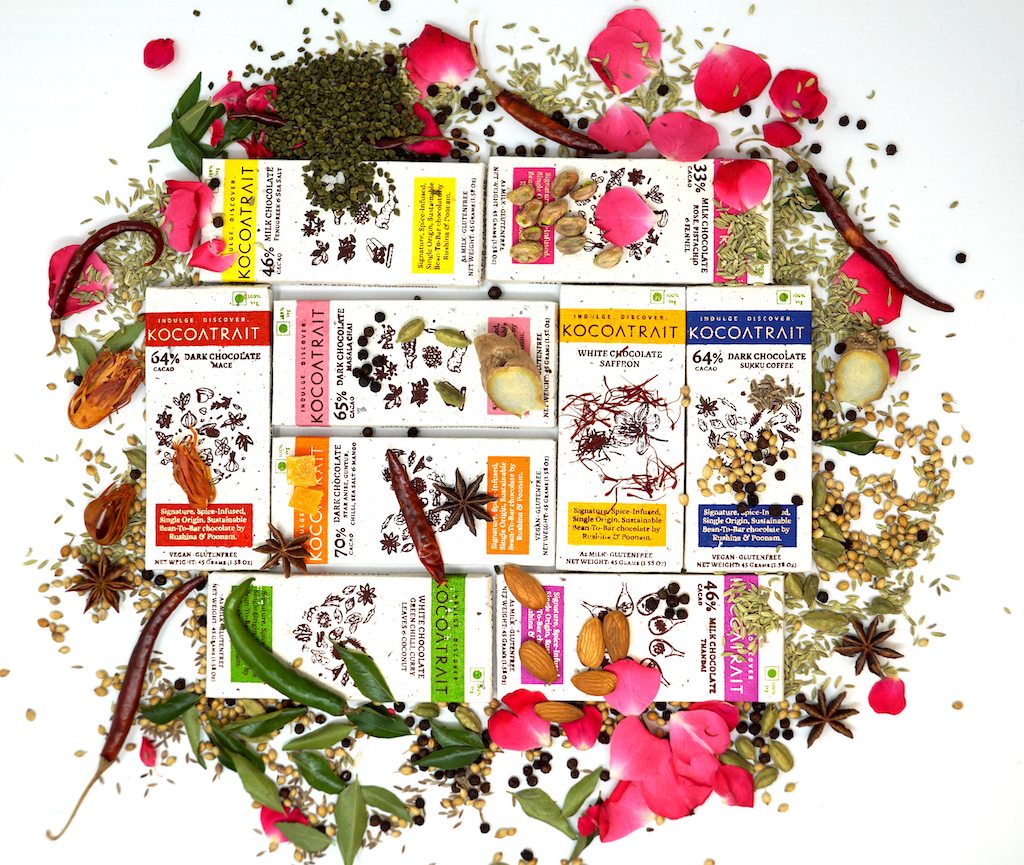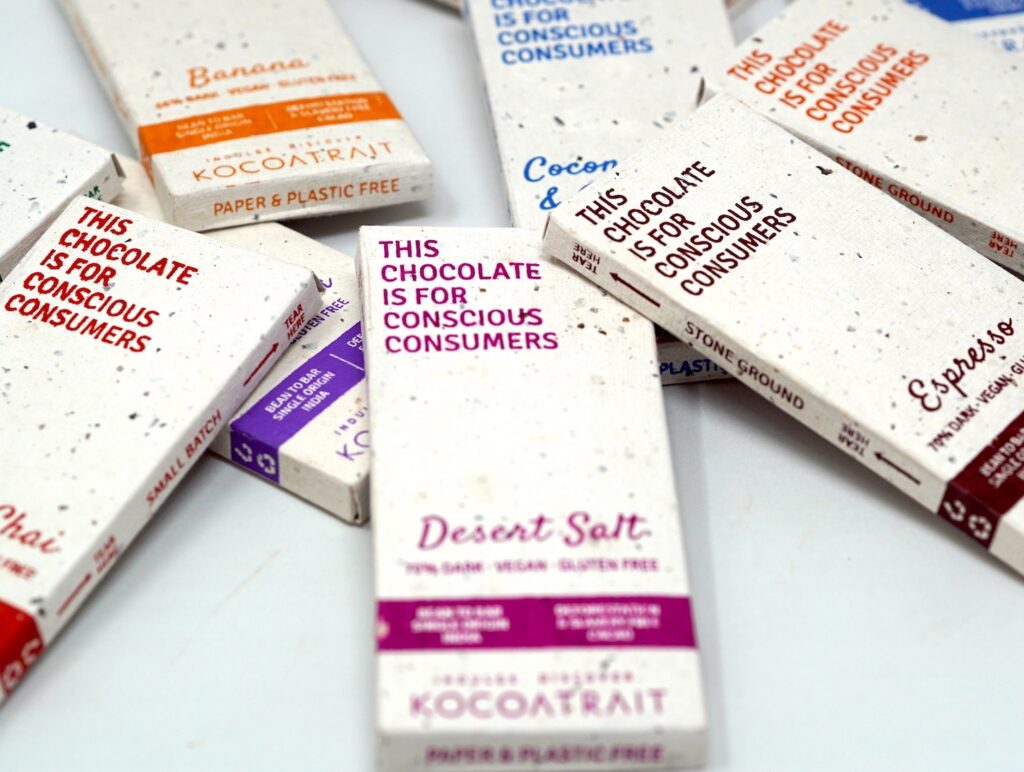10th April 2021, Chennai, India
The year 2021 can be considered a tipping point for the Bean to Bar industry in India. The bean to bar chocolate market in India has witnessed unprecedented growth in the last 2-3 years and is worth about 10 Crores (Cocoatrait Research) in 2021. India currently boasts of around 28 small, medium and large sized bean to bar chocolate makers all demonstrating healthy growth rates and growing at over 40% Y-O-Y on an average. Cocoatrait forecasts that there would be over 40 branded bean to bar chocolate makers by 2022. Interestingly, Covid-19 has only had a temporary dampening effect on the category and there seems to be minimal impact on sales overall in the year 2020.
For the interested, many mass produced industrial chocolates are also made from bean to bar. However, not all. In fact several premium and luxury chocolate brands do not control their entire chocolate making process. They simply buy bulk industrially produced chocolate and melt them, mix certain ingredients and mould them into chocolate bars or other chocolate products. This can be a fairly simplistic process and a bean to bar chocolate maker has a lot on the plate to deal with.
Understanding of how flavours of cacao are impacted by genetic variety (genotype), climate, bean composition, soil type, age of cocoa tree, postharvest treatments of the beans such as fermentation and drying, processing such as roasting, refining, conching, tempering as well as storage and transportation make bean to bar chocolates a balanced mix of both a science and art. This is a very interesting subject for chocolate makers, the trade and consumers alike.
From the supply side, this rise of craft or artisanal Bean to Bar chocolate makers in India has been bought about by the availability of small scale equipments, access to knowledge/technology and availability of raw materials (cacao beans) locally. Consumer exposure towards fine foods and beverages like wine, speciality coffee, teas & beer attributed primarily to increased travel, rise in disposable income, decreased propensity to savings and access to information has driven demand noticeably over the last few years.
In India and even globally, there is a misconception about terms such as “craft,” “fine” “artisanal” or “small batch,” in chocolate and in other food categories. Many chocolate brands available on Indian shelves have been imported and/or finished in India using bulk chocolate made industrially from the bulk variety of beans which are usually imported from bulk cacao producing countries like africa. By alkalising cacao, mass market chocolate manufacturers are able to manipulate the flavour, acidity and colour. This is why mass-market dark chocolate is usually intensely bitter with little flavour complexity and are overly dark in colour. The intense bitterness after alkalising is then offset by adding excessive sugar and also milk (in some cases) to make it more palatable to the masses consuming it as a replacement of traditional sweets! This bitterness becomes evident when you consume a 50% dark chocolate where most of the balance 50% is sugar and the chocolate still remains bitter.
Time needed: 5 minutes
This is why we decided to write this blog post to help understand why it makes more sense to support bean to bar chocolates over mass produced supermarket or imported chocolate brands and why choosing a chocolate made from Indian cacao beans almost becomes a duty of an Indian citizen.
- Better for the Farmer
The reality is that, in the traditional mass market cacao & chocolate value chain, the farmer realises a fraction of the value of the final chocolate product sold. Bean to bar makers pay a premium for better quality beans, mainly because they lack the expertise to process lower quality beans and make fine chocolate with it. It is usually more beneficial that a farmer embraces direct-trade (with the bean to bar maker) rather than fair-trade certifications. When the farmer gets a premium for his beans over the fair trade price, he is able to pay market wages to the labourers working at the farm. In many cases, we have seen farmers forward integrating to become farm to bar makers or as some say soil to bar makers. This certainly ensures that all the value generated is benefitting the farmer directly. Further, farmers are encouraged to improve their post harvesting processes and this helps them increase the value of their produce and make them self reliant.
- Better for the planet
Apart from Bean to bar chocolates being beneficial for the farmer, they are also better for the sustainability of the land where it is grown, our planet and the environment overall. Cacao trees thrive in Biodiverse Environments. Bulk cacao for mass-market chocolate is often grown in monocultures, whereas fine flavour cacao used to make bean to bar chocolates, usually rely on varieties grown in polyculture where more than one plant species are grown together and imitate the diversity of natural agroforest ecosystems. It is also believed that cacao when grown polyculture agroforestry systems, also have higher carbon capture capacity benefitting the planet greatly. Further, due to their agility and small size, most Indian bean to bar makers have the ability to practise sustainability in various measures at the farm, in chocolate production process and also in their packaging and distribution.
- Better for the Consumer
As you have observed, bean to bar chocolates are usually better for the farmer, better for the environment, BUT is it better for consumers? Bean to Bar chocolate makers take pride in their high quality and short ingredient lists. A bar of craft chocolate is usually made of cacao, cocoa butter, and sugar. The emphasis for craft chocolate has always been on flavour, texture and taste – which means the cacao is the star of the bar. These chocolates elevate the overall experience of a chocolate bar. With innovative natural flavours and ingredients used, boundaries are expanded and it raises the bar for consumers. This is in contrast to mass market chocolates. Over processing of chocolate leads to loss of vital benefits of cacao in mass produced chocolates. Various studies over the last few years have discovered that cacao is packed with antioxidants and flavanols. Diets high in antioxidants and flavanols have shown to benefit cardiovascular health, provide anti-inflammatory properties and help regulate blood sugar. There is a lot of research which suggests that consuming dark chocolate which is high in cacao has positive implications on stress levels, mood, memory and immunity. However, here’s the catch: not all chocolate contains the same amount of antioxidants. We believe that while it is easy to call chocolate a health product, we remain committed to calling a craft bean to bar chocolate as a healthier alternative rather than a healthier product. What are the health benefits of bean to bar chocolates? How real are they? Click to read more.
- Making India Atmanirbhar
Atmanirbhar Bharat, which translates to ‘self-reliant India’, is the Hindi phrase used in relation to economic development in India. With the rise of bean to bar makers, 100% truly indian chocolates are now being offered. These chocolates made from bean to bar, use only indian ingredients starting from cacao beans, sugar and cocoa butter. Most equipments used are Indian. Indian Stone grinders make for an interesting equipment used for processing. Even the packaging material is 100% made in india. Hence consuming an indian origin bean to bar chocolate helps India remain atmanirbhar and greatly reduces the reliance on imports. The value is generated in india and is consumed in india and hence helps india remain self reliant. This is a very important contribution in helping build the economy.
- Supporting local artisans
Prime Minister of India’s latest slogan “Be vocal about local” has certainly captivated the Indian audiences in the recent past, and rightly so! While chocolate is a lot of fun, making chocolate, especially when you start from cocoa beans all the way to the final chocolate bar, is a difficult job! Bean to bar chocolate makers find the right cacao, establish trustworthy relationships with cacao farmers and to plan the entire supply chain properly. Like for every artisan, precision and patience are keys in trying to achieve the best chocolate possible. Only true passion and the unending drive to supply great products can make them go through so many difficulties. The introduction of local flavours further add an element of innovation and make for interesting offerings. It is our national duty to support bean to bar chocolate makers!
- Supporting the Startup Ecosystem and Formalisation of Micro Food Processing Enterprises
Startups and Micro Food Processing Enterprises are small companies but they usually play a significant role in economic growth of a country. They create more jobs and more employment means an improved economy. Not only that, they also contribute to economic dynamism by spurring innovation competing directly with established and larger companies and increase healthy competition which propels consumer spending and hence contribute directly and indirectly to taxes. In the case of bean to bar chocolates, they also help us expand the geographic reach of the products which are traditionally concentrated in urban areas.
- Facilitating innovation
With an ability to make chocolate exciting again, bean to bar chocolate makers have complete freedom to experiment with outrageous flavours, designs, techniques and creations in all aspects and at each stage of the chocolate. This brings new dimensions of flavour, experience and innovation into the process and extends the reach of the category to more consumers.

At this nascent stage of the bean to bar industry in india, one needs to be wary of claims that are being made by chocolate brands who wrongly position themselves as fine, craft or artisanal. While consumers tend to judge a book by its cover (literally), a pretty wrapper is not the best indicator of great flavour or pure craftsmanship. Working with industrially made bulk chocolate and simply melting it to be put on moulds is significantly easier than selecting, sourcing, sorting, grading, roasting, cracking and de-shelling cacao beans! We have added a new post on the current state of the Indian cacao bean and chocolate here.
For Further details contact the author: L Nitin Chordia; +919600064846; nitin@cocoatrait.com


Very interesting concept and chocolate flavours. However, priced at Rs 235 and above makes these chocolates rather unaffordable for most Indians.
Hi Priti, We do appreciate your feedback. While we would like to offer lower prices, we also believe that it will hamper our ability to be planet friendly. We have helped save 150+ kgs of single use plastic from being dumped into landfills and this is the effort that requires support from citizens like yourself. I do hope that you can contribute to our cause. Look forward to your support. Team Kocoatrait